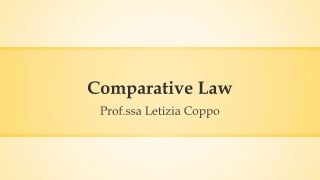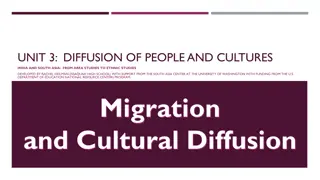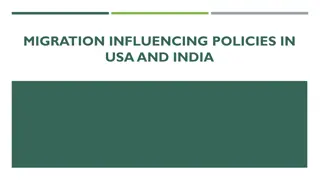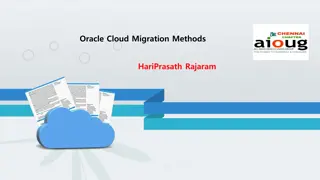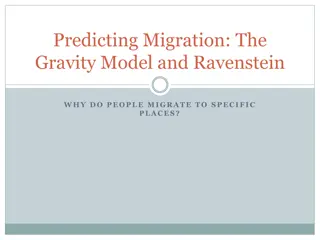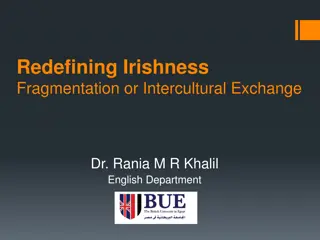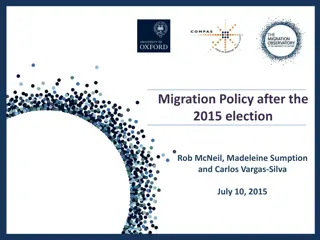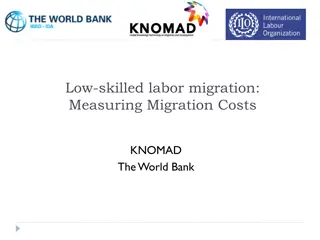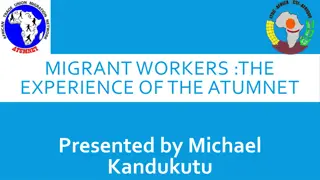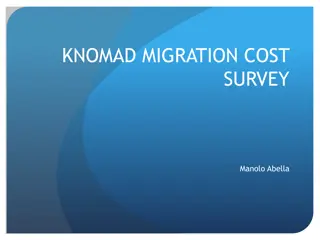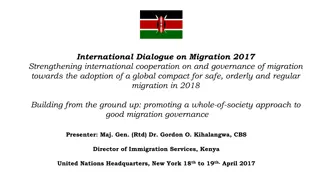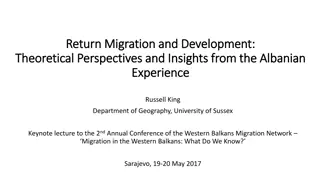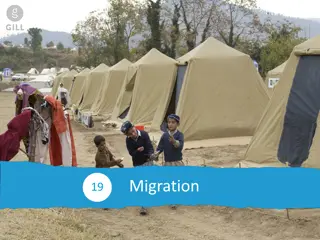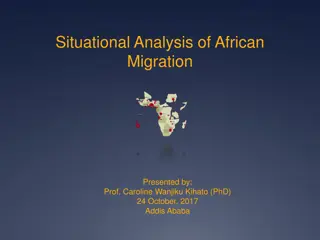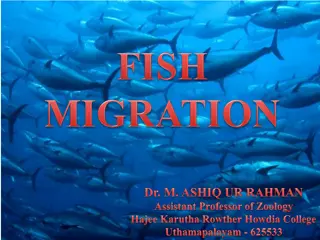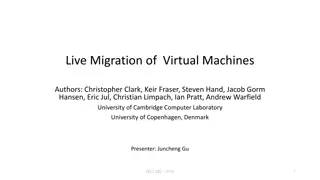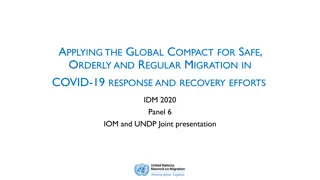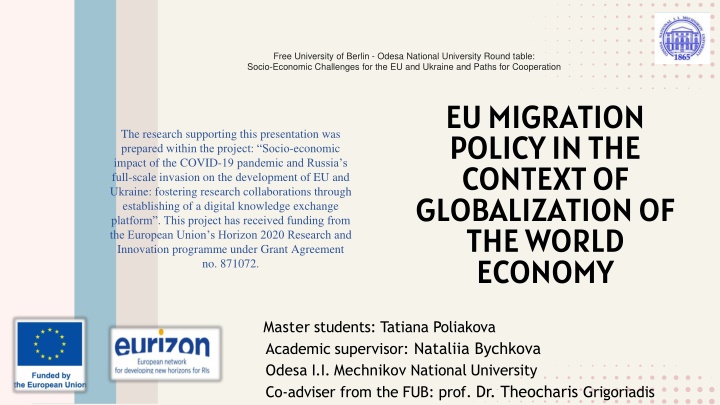
EU Migration Policy in the Globalized Economy
Migration policy challenges within the EU, the impact of the COVID-19 pandemic and Russia's invasion on EU and Ukraine, research collaborations, and funding from the Horizon 2020 program for socio-economic development. Literary reviews on EU policy discourse regarding migration security and governance.
Download Presentation

Please find below an Image/Link to download the presentation.
The content on the website is provided AS IS for your information and personal use only. It may not be sold, licensed, or shared on other websites without obtaining consent from the author. If you encounter any issues during the download, it is possible that the publisher has removed the file from their server.
You are allowed to download the files provided on this website for personal or commercial use, subject to the condition that they are used lawfully. All files are the property of their respective owners.
The content on the website is provided AS IS for your information and personal use only. It may not be sold, licensed, or shared on other websites without obtaining consent from the author.
E N D
Presentation Transcript
Free University of Berlin - Odesa National University Round table: Socio-Economic Challenges for the EU and Ukraine and Paths for Cooperation EU MIGRATION POLICY IN THE CONTEXT OF GLOBALIZATION OF THE WORLD ECONOMY The research supporting this presentation was prepared within the project: Socio-economic impact of the COVID-19 pandemic and Russia s full-scale invasion on the development of EU and Ukraine: fostering research collaborations through establishing of a digital knowledge exchange platform . This project has received funding from the European Union s Horizon 2020 Research and Innovation programme under Grant Agreement no. 871072. Master students: Tatiana Poliakova Academic supervisor: Nataliia Bychkova Odesa . . Mechnikov National University -adviser from the FUB: prof. Dr. Theocharis Grigoriadis
1 INTRODUCTION Migration policy is recognised as one of the key problems of the European Union (EU), which is related to the financial sector and the need to ensure the security of the Member States in general. At the same time, the inability to effectively implement migration pressure has a negative impact on the formation of international relations between the EU member states, and also contributes to disagreements between the main leaders who block quick and effective solutions to the return of illegal migrants to their homeland. FREIE UNIVERSIT T BERLIN | 2024
2 LITERARY REVIEW The article Identifying Security Logics in the EU Policy Discourse: The Migration Crisis and the EU (2022), written by M. St pka, demonstrates the complexity of the relationship between migration and security in the context of the EU policy discourse. The main emphasis is placed on the use of the concept of securitisation to explain how migration is interpreted and considered within the political framework of security. FREIE UNIVERSIT T BERLIN| 2024 1 The article Halting Ambition: EU Migration and Security Policy in the Sahel (2022) by Andrew Lebovic focuses on a comprehensive study of the European Union's (EU) strategy on migration and security policy in the Sahel region. It focuses on the problems of integrating security and development strategies, as well as assessing the effectiveness of these programmes in the context of the geopolitical complexity of the region. 2
3 LITERARY REVIEW The article Introduction: EU External Migration Policy and EU Migration Governance (2023) explores the complex and multifaceted nature of the European Union's external migration policy, including its evolution, conceptualisation and interaction with other policy instruments. The authors, Arne Niemann and Natasha Zaun, focus on the dynamics of the EU's migration policy, which has become a key element of the Union's foreign policy activities, especially after the 2015-2016 migration crisis. FREIE UNIVERSIT T BERLIN| 2024 3 The article Do EU Policies Constrain Government Autonomy? Insights from the Implementation of EU Migration Policies (2024) explores the complex relationship between European Union (EU) migration policies and the level of autonomy of national governments in the member states. The author analyses the impact of EU policies on the ability of governments to pursue their own policies, taking into account their migration priorities and the degree of involvement in European integration processes. 4
4 POLICY/FRAMEWORK Objectives: Balance security, economic development, and humanitarian concerns; manage migration flows and promote integration. Frameworks & Tools: Common European Asylum System and Dublin Regulation for asylum processes. Partnerships with non-EU countries (e.g., Turkey, African nations) to manage migration at the source. Frontex for border surveillance and crisis response. Recent Challenges: Refugee crises (Middle East, Ukraine war) testing adaptability and solidarity. Ethical concerns over human rights in external partnerships. Economic Considerations: Legal migration routes and skilled worker integration to address labor shortages and demographic challenges. Key Issues: Fragmented implementation, varying member-state commitments, and public skepticism. FREIE UNIVERSIT T BERLIN| 2024
5 DATA A panel data regression model examines the impact of such indicators as the number of employed and the minimum wage on the number of immigrants in a Belgium, Denmark, Austria, Germany, France, and the Netherlands for the period from 2002 to 2022. The model looks as follows: where IMMIGR amount of immigrants in each country; constant; slope coefficients; EMPLOY amount of employed people in the country; MWAGE minimum monthly salary in EUR; standard error. FREIE UNIVERSIT T BERLIN| 2024
DATA 6 Coefficients and their statistical evaluation Unified data model (pooled) Random effects model (RE) Fixed effects model (FE) Model parameters Coefficients Coefficients Coefficients (t-statistics) (t-statistics) (t- statistics) 180747 169928 180747 Constant 2,453** 2,278** 2,453** 19,2200 19,1914 19,2200 EMPLOY 16,95*** 16,83*** 16,95*** 126,790 119,122 126,790 MWAGE 2,426** 2,252** 2,428** Log probability - 1688,288 1686,364 Fstat. 147,9546 0,731971 - (p-value) (0,0156) (0,0245) R2adjusted 0,701606 - 0,715213 FREIE UNIVERSIT T BERLIN| 2024
7 METHODOLOGY Quantitative Method FREIE UNIVERSIT T BERLIN| 2024 investigating the pull factors driving migration flows into the EU. Using panel data from six EU countries (Belgium, Denmark, Austria, Germany, France, and the Netherlands) over the period 2002 to 2022, the analysis examined variables such as employment levels and minimum wages to assess their impact on immigration trends. Qualitative Method systematic review of academic literature, focusing on themes such as securitization, externalization, and the interaction between EU directives and national policies.
FREIE UNIVERSITT BERLIN| 2024 THANK YOU

